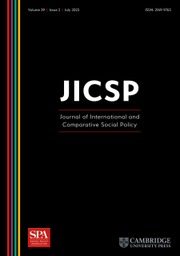Article contents
The social legitimacy of basic income: a multidimensional and cross-national perspective. An introduction to the special issue
Published online by Cambridge University Press: 03 December 2020
Abstract
In this special issue, authors present and discuss the findings of a series of recent national and EU cross-national empirical studies on public support for basic income. As such, the special issue offers new and innovative insights on such support and its individual and contextual drivers. The articles employ heterogeneous data and methods and therefore, as a whole, navigate the multi-dimensional nature of (opinions on) basic income. Three of the contributions use unique survey data to study the levels of support for basic income among various European populations and the complex ideological and social divides that explain such support. The other two contributions use qualitative data, from democratic fora, focus groups and in-depth interviews, to explore how citizens interpret basic income and what types of arguments they use in favour or against the implementation of the policy.
- Type
- Research Article
- Information
- Copyright
- © The Author(s), 2020. Published by Cambridge University Press on behalf of Social Policy Association
References
- 4
- Cited by


